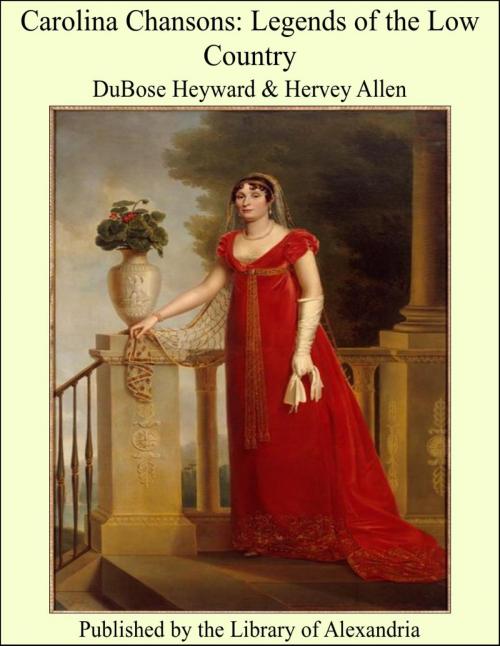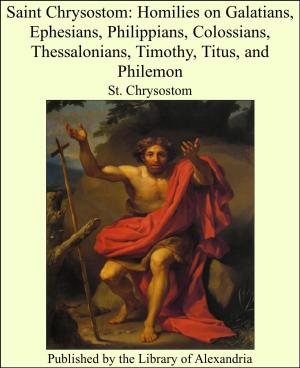Carolina Chansons: Legends of the Low Country
Nonfiction, Religion & Spirituality, New Age, History, Fiction & Literature| Author: | DuBose Heyward | ISBN: | 9781465507501 |
| Publisher: | Library of Alexandria | Publication: | March 8, 2015 |
| Imprint: | Language: | English |
| Author: | DuBose Heyward |
| ISBN: | 9781465507501 |
| Publisher: | Library of Alexandria |
| Publication: | March 8, 2015 |
| Imprint: | |
| Language: | English |
When travelling lately through the Simplon—one of the great Alpine passes leading from Switzerland into Italy—I observed, close by the roadside, at regular distances, a number of plain, square buildings. On these (sometimes over the doorway, sometimes on the side) were inscribed the words—“Refuge No. 1,” “Refuge No. 2,” “Refuge No. 3,” &c. I think there were twenty altogether. I was told, on inquiry, they were intended as shelters for any hapless travellers who might be overtaken by the sudden storms which so often sweep down from the snow-white mountains bounding the prospect. These “Refuges,” at the time I saw them, were empty, for it was in the beginning of summer, when everything, even in that elevated region, was looking bright and green. The Alpine rhododendron was flushing, with its pink blossom, the mountain sides; or growing up, along with the lovely blue gentian, close by stray patches of winter's snow which were still filling the ridges and hollows in the higher parts of the pass. Seldom at this season are travellers exposed to any peril from an Alpine storm. It is different, however, in winter or spring, when the avalanches come tumbling from the heights, or the snow is drifting in huge masses over that wonderful Road. Many shivering wayfarers have fled with thankful hearts into these shelters. Some have been carried thither, in a state of insensibility, by unknown benefactors, and on gradually awaking to consciousness, have blessed the kind hearts and hands which have saved them from certain death, and are now ministering to their necessities. By Others, alas! they have been reached too late. Rescued from the snows of the mountain, they have been conveyed to them only to die. As I passed those Alpine “Retreats,” I could not help being reminded of the wonderful Cities of Refuge which God graciously provided of old in Palestine for the unfortunate manslayer.
When travelling lately through the Simplon—one of the great Alpine passes leading from Switzerland into Italy—I observed, close by the roadside, at regular distances, a number of plain, square buildings. On these (sometimes over the doorway, sometimes on the side) were inscribed the words—“Refuge No. 1,” “Refuge No. 2,” “Refuge No. 3,” &c. I think there were twenty altogether. I was told, on inquiry, they were intended as shelters for any hapless travellers who might be overtaken by the sudden storms which so often sweep down from the snow-white mountains bounding the prospect. These “Refuges,” at the time I saw them, were empty, for it was in the beginning of summer, when everything, even in that elevated region, was looking bright and green. The Alpine rhododendron was flushing, with its pink blossom, the mountain sides; or growing up, along with the lovely blue gentian, close by stray patches of winter's snow which were still filling the ridges and hollows in the higher parts of the pass. Seldom at this season are travellers exposed to any peril from an Alpine storm. It is different, however, in winter or spring, when the avalanches come tumbling from the heights, or the snow is drifting in huge masses over that wonderful Road. Many shivering wayfarers have fled with thankful hearts into these shelters. Some have been carried thither, in a state of insensibility, by unknown benefactors, and on gradually awaking to consciousness, have blessed the kind hearts and hands which have saved them from certain death, and are now ministering to their necessities. By Others, alas! they have been reached too late. Rescued from the snows of the mountain, they have been conveyed to them only to die. As I passed those Alpine “Retreats,” I could not help being reminded of the wonderful Cities of Refuge which God graciously provided of old in Palestine for the unfortunate manslayer.








![Cover of the book Rocky Mountain [Colorado] National Park by DuBose Heyward](https://www.kuoky.com/images/2015/march/300x300/9781465508690-kJJ6_300x.jpg)






